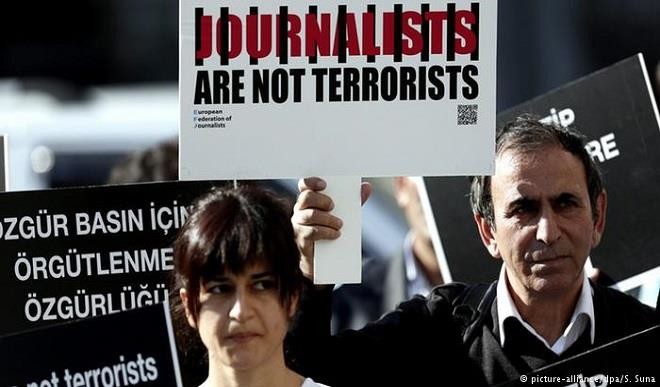International press demands release of detained Turkish journalists
Following an international press freedom mission to Turkey on 27 February to 2 March 2017, a group of journalists, representing six international free expression watchdog organisations, have expressed severe concerns over media freedom and respect for human rights in Turkey. They warn that the country’s democracy is under threat following ongoing purge by the government […]


Following an international press freedom mission to Turkey on 27 February to 2 March 2017, a group of journalists, representing six international free expression watchdog organisations, have expressed severe concerns over media freedom and respect for human rights in Turkey.
They warn that the country’s democracy is under threat following ongoing purge by the government following the failed 15 July 2016 coup attempt.
Hundreds of thousands have been dismissed from jobs or detained under wide-ranging emergency powers granted after the coup attempt. This includes some 155 journalists and media workers behind bars, 125 of whom have been arrested since the coup attempt.
“Most were detained for alleged support of terrorists on shifting, contradictory and illogical accusations that relate to their criticism of government officials or policy. Journalists held for months in pre-trial detention are punished without conviction, having been presented with no indictments illuminating the charges or evidence against them,” the declaration signed by representatives of BBC Scotland, ARTICLE 19, Swedish PEN, Reporters Without Borders (RSF), Association of European Journalists (AEJ) and the European Centre for Press and Media Freedom (ECPMF) said.
The declaration went ahead to say that the detained journalist faced “arbitrary limits on outside contact and interference with the right to mount a legal defence” saying that these developments cast doubt on judicial independence and rule of law.
The mission also preceded an April 16 referendum on constitutional changes that would convert Turkey from a parliamentary to a presidential system, vastly expanding the president’s powers over all branches of government.
“Mass closures of media outlets by executive decree under the state of emergency have left few remaining spaces for the expression of opinions not in line with the government’s views; voters will be forced to make crucial decisions about the political system of the country under state of emergency conditions and within a severely restricted space for public debate,” the declaration said.
Mission delegates met with journalists and media facing unwarranted pressure; with detained journalists’ families and attorneys; and with civil society, opposition politicians and foreign diplomats.
However, representatives of Turkey’s Justice Ministry and advisers to Erdoğan refused to meet with them, and the Ministry ignored delegates’ request to visit imprisoned journalists, the delegates reported.
But that has not stopped the delegates from making demands of the Turkish government amongs which are that all journalists and others detained for engaging in free expression or sharing news or other public interest information and recommit to upholding international human rights norms should be released.
